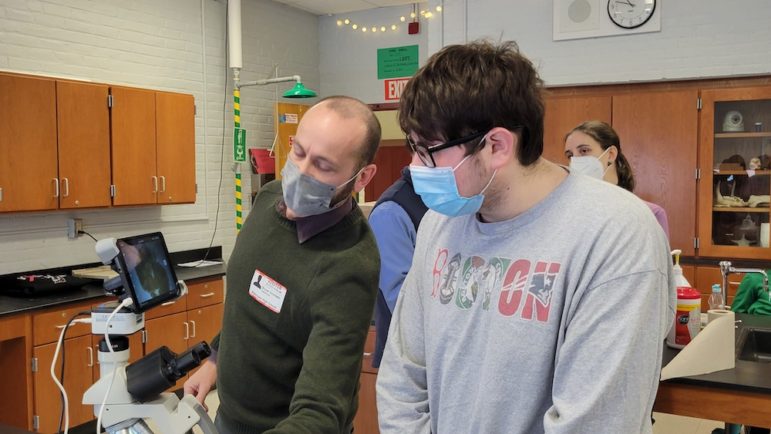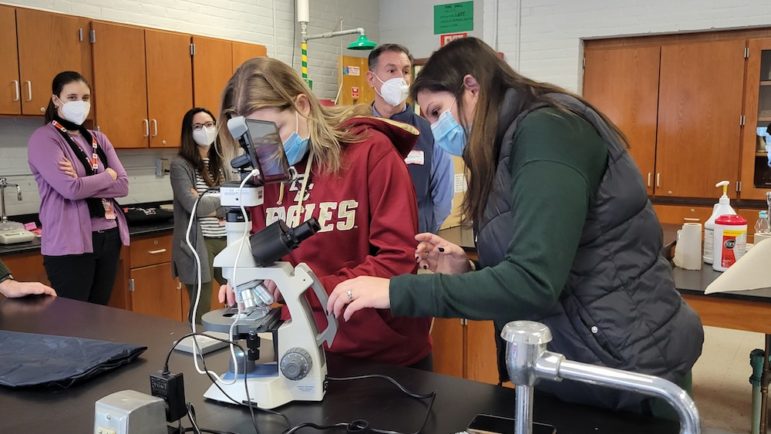
Charlie Breitrose Bryan Goodwin, chief biologist at Enanta Pharmaceuticals, and Watertown High School Senior Phil Centola look at a new microscope donated by the biotech company.
Watertown-based Enanta Pharmaceuticals has a potential therapy for COVID-19 ready for human testing, and it also hopes to develop some future scientists with a donation to Watertown High School.
On Monday morning, representatives from Enanta presented three new microscopes donated by the company to the WHS Science Department. The equipment can be hooked up to a tablet or cellphone to make it easier to see objects under magnification, and images can even be shared with other devices.
The school had one of the microscopes, said Lynsey Kraemer, the district’s Science Curriculum Coordinator for Grades 8-12, but the district could not afford more. This year, she was approached by Harry Trout, vice president of finance for Enanta.
“Mr. Trout wanted to help,” Kraemer said. “We said additional microscopes would help. Every biology class would have one, so teachers do not have to share or take turns. ”
On Monday, science teacher Amanda Makosky demonstrated how to use the microscope in her anatomy and physiology class. The image from the microscope appears on the tablet hooked up to the microscope, and also on Makosky’s cell phone.
“The microscope has its own wifi,” Makosky said. “It has an app. If you download it you can do experiments and they can see what’s happening in real time.”
That feature will help with experiments, especially in times of COVID-19 when students must distance from each other in class.
“With COVID, working on labs has been a challenge,” Makosky said.
Enanta has tried to form ties with the local community, including hosting “lunch and learns” where Watertown students visit the company to see the labs and find out more about careers in life science. Trout told the class that the Boston area is now the top life science center in the world, with hundreds of companies like Enanta, but these firms are having trouble finding qualified employees.
“The Boston Globe just did a story saying there are 40,000 unfilled jobs in Massachusetts,” Trout said. “There are a lot of jobs. We need you to continue your science education.”
Charlie Breitrose
Watertown High School science teacher Amanda Makosky shows senior Meridith Greene how to use the new microscope that was donated by Watertown-based Enanta Pharmaceuticals. 
One such scientist is Bryan Goodwin, a vice president and head of biology at Enanta. He said that his career has taken him around the world, from his birthplace in the United Kingdom, to Australia and now to Watertown. He said he is always looking for people with science degrees to work at the company.
“There are a lot of positions we can’t fill. We are looking at this as a good area, whether you go straight from college or you can go on to get a graduate degree,” Goodwin said. “I got a Ph.D. in Sydney.”
He said about half the scientists working at Enanta have a master’s degree, and half have doctorates. Some are biochemists, some virologists, others are pharmacologists or molecular and cellular biologists. There are also opportunities for people with backgrounds in data analysis and computer programming.
Enanta has worked on a number of therapies, including creating a cure for Hepatitis C in collaboration with AbbVie, Trout said.
Many of the company’s treatments focused on liver diseases, said Jay Luly, Enanta’s president and CEO. In recent years, however, the company shifted the focus to respiratory diseases, including RSV (respiratory syncytial virus), which is the most common cause of bronchitis and pneumonia, and can be serious for infants or the elderly. They also worked on metapneumovirus, another respiratory disease.
“We were working on RSV, human metapneumovirus and then the pandemic broke out,” Luly said. “We thought about it for a nanosecond and said we have got to do this.”
The scientists got to work in Enanta’s labs as soon as possible, but they were delayed by the lockdowns in the early days of the pandemic. When they were able to return to the lab, Luly recalled, people worked in shifts to keep down the numbers of people in the lab at one time. They also faced supply chain delays.
Despite the challenges, they came up with a promising molecule that would stop the COVID-19 virus from reproducing.
“We spent the last part of last year and first part of this year getting all that ready,” Luly said. “We are on track to start human clinical trials in February.”
First, the drug will be tested on healthy adult volunteers to figure out the dosing. If that goes well, Luly said by the second half of the year they will begin tests on people who have COVID.
The goal is to come up with a treatment that can be taken when someone tests positive for COVID. Luly said the earlier treatment starts the better.
“Maybe you are symptomatic, wake up one morning and feel a cold or something coming on,” Luly said. “You don’t know what it is. You do a home test, and if it turns out positive for COVID we want you to be able to call your doctor, Zoom in, show the test results, and they give you a script you can call into CVS and start taking the pills.”
Enanta would like to create a therapy that can be taken orally, once a day, Luly said. The most challenging part is to figure out how well the medicine is absorbed by the body and get it into the bloodstream.
“It is a very difficult thing. There are a lot barriers between the mouth and the bloodstream,” Luly said. “There are good reasons why the body is set up to prevent things from getting in.”
If the drug gets approval from the FDA, the next step is for Enanta to find a partner to manufacture and distribute it.
“We aren’t big enough at this point to do that. That doesn’t mean we can’t develop it,” Enanta said. “That’s what did with Hepatitis C. We sold it in close to 80 countries.”
Enanta is one of many companies seeking to come up with a treatment to fight the global disease.
“You can imagine, there is more and more competition in this arena. That’s good, competition is good. It makes people always do their best. And having multiple treatments is better than just one,” Luly said. “There are definitely other companies going at it, but we have got one of the small handful of molecules that have shown promise.”
This is an outstanding effort made by Enanta. To partner with Watertown High provides an excellent expression for the STEM education we need in our schools.
Nothing but good can come of this for all of us!